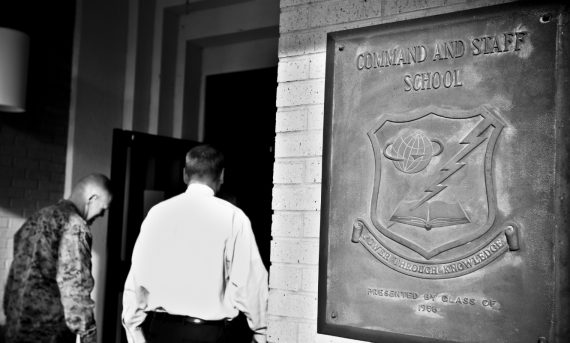Rigor in Professional Military Education
My latest for War on The Rocks, "Professional Military Education and the Rigor Problem, has posted.
My latest for War on The Rocks, “Professional Military Education and the Rigor Problem, has posted. It’s a response piece and rather inside baseball, making excerpting difficult. Here’s a taste:
While there is undoubtedly substantial room for reform in America’s professional military education (PME) system, measuring “rigor” is much more complex than counting buzzwords in school mission statements. Murray’s essay elides the diversity of the PME experience and substantial distinctions between the intermediate- and top-level schools. Further, much of the problems of measurement he points to are just as apparent, if not more so, in graduate education everywhere. Indeed, it’s arguable that PME is more rigorous by Murray’s standards than most civilian master’s programs.
[…]
[T]heir curricula are vetted through an internal review process and subject to outside accreditation by both the same regional body that reviews other colleges and universities in the state as well as by the Joint Staff. At my institution, the Marine Corps Command and Staff College, students in all 16 conference groups are assigned the same set of readings and graded on the same set of written assignments assessed using a standardized rubric. While there’s variation across the board in teaching style, emphasis, grading standards and the like, it’s nothing like what exists in civilian colleges. I’ve taught at several of them and was in every instance the sole arbiter of what readings to assign, what content to teach, what types of graded assignments to offer, and how I would grade them. This was even true of the courses I taught as a graduate student.
Indeed, professional pride on the part of the professoriate is the main guarantee of “rigor” in civilian universities. There’s next to zero emphasis on teaching in most graduate programs, where tenure and promotion are almost entirely based on scholarly production, ability to attract grant money, and the like. Professors would revolt against deans or provosts who even presumed to question the rigor of their courses.
PME, by contrast, is more regimented, for both good and ill. But our faculty, both military and civilian, have very powerful professional incentives to hold our students to high standards. After all, they will plan and lead our country’s future wars.
More at the link.







I have been to PME (Air Force) both in residence and in correspondence albeit 25-30 years ago. Back then, I didn’t consider it rigorous at all and more of a check the block exercise. In fact, Air Command and Staff was perjoratively called Air Command and Golf. From what I gather from current students is that today’s PME is more rigorous. Now rigor is a loose term and from what I observed, there are more tasks to accomplish and complete but not necessarily conducive to higher level thinking processes. And it still is considered more a block checking activity and similar to civilian professional education processes which are rampant with credentialism.
James,
PME (Air Force) has, as Scoot said, become more of a check the block exercise. It’s almost as if they have taken blocks directly from the performance reports and decided to teach the test. Leadership block, check. Physical fitness, check. Supervisory, check. While all of these things are important, they don’t improve thought. They don’t teach how to figure out situations, they simply teach a to b to c, while never delivering a method to get from a to c directly. This is the military way and you must learn it and spew it back at us in the exact same order we taught it.
@Scott: @Jack: Air University is generally considered the worst of the PME experiences, Marine Corps University, because of a combination of factors, is a lot stronger. We’re newer, having started in the current incarnation just after the Skelton Commission. Our founding commanding general, Paul Van Riper, is an intellectual and insisted on really grappling with military history, in particular. Unlike most of our sister schools, our civilian PhDs are actually civilians with actual PhDs; most of the rest prefer to hire retired colonels with pseudo degrees. Even so, there’s at least a common roadmap to follow and actual standards that have to be enforced; there’s really nothing like that in civilian higher ed.
This will sound cynical, and perhaps it is, but Murray expects Congress to set the standard for critical thinking?
“Politics is the art of looking for trouble, finding it everywhere, diagnosing it incorrectly and applying the wrong remedies.” -Groucho Marx